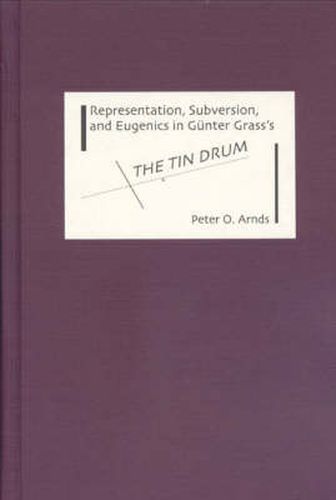Representation, Subversion, and Eugenics in Gunter Grass's The Tin Drum
Peter Arnds

Representation, Subversion, and Eugenics in Gunter Grass’s The Tin Drum
Peter Arnds
In receiving the Nobel Prize for Literature in 1999, Gunter Grass, a prominent and controversial figure in the ongoing discussion of the German past and reunification, finally gained recognition as Germany’s greatest living author and as a writer of international importance and acclaim. If there is one book in post-1945 German literature that is known throughout the world, it is Grass’s novel The Tin Drum (1959), which remains one of the most important works of literature for the construction of postwar German identity. Peter Arnds offers a completely new reading of this novel, analyzing an aspect of Grass’s literary treatment of German history that has never been examined in detail: the Nazi ideology of race and eugenics, which resulted in the persecution of so-called asocials (including the physically and mentally handicapped, criminals, homosexuals, and vagabonds) as life unworthy of life, their extermination in psychiatric institutions in the Third Reich, and their marginalization in the Adenauer period. Arnds shows that in order to represent the Nazi past and subvert bourgeois paradigms of rationalism, Grass revives several facets of popular culture that National Socialism either suppressed or manipulated for its ideology of racism. In structure and content Grass’s novel connects the persecution of degenerate art to the persecution and extermination of these asocials, for whom the persecuted dwarf-protagonist Oskar Matzerath becomes a central metaphor and voice. This comparative study reveals that through intertextuality with the European fairy-tale tradition, the picaresque novels of Rabelais and Grimmelshausen, and through an array of carnivalesque figures-the mythological trickster, the clown, the fool, and the harlequin-Grass creates an irrational counterculture opposed to the rationalism of Nazi science and its obsession with racial hygiene, while simultaneously exposing the continuity of this destructive rationalism in postwar Germany and the absurdity of a Stunde Null, that putative tabu.
This item is not currently in-stock. It can be ordered online and is expected to ship in approx 4 weeks
Our stock data is updated periodically, and availability may change throughout the day for in-demand items. Please call the relevant shop for the most current stock information. Prices are subject to change without notice.
Sign in or become a Readings Member to add this title to a wishlist.

